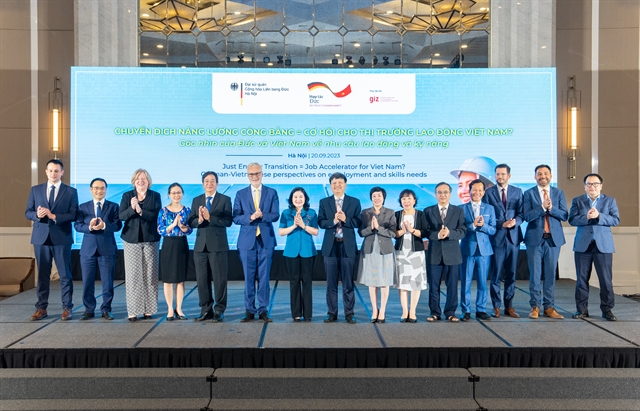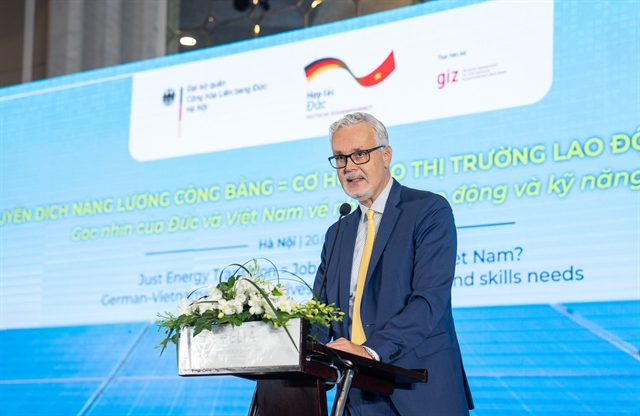
In pursuit of a Just Energy Transition (JET), nations and governments are expected to have appropriate policies to transition employment, creating “suitable and decent jobs” linked to green energy production and energy efficiency.
How can we pave the way for green job development and a green workforce while ensuring a just transition where no one is left behind? This was one of the crucial topics discussed at the conference “Just Energy Transition = Job Accelerator for Việt Nam? German-Vietnamese perspectives on employment and skills needs” held in Hà Nội on September 20, 2023. The event was organised by the German Embassy Hà Nội with the support from Deutsche Gesellschaft fuer Internationale Zusammenarbeit (GIZ).
How will the job market go “green” alongside the energy transition?
According to the International Labour Organization (ILO), six million jobs in coal-related industries worldwide are foreseen to disappear by 2030. Simultaneously, many of the potential 24 million new green jobs will require different skills than previous energy jobs or will be in new locations. (1 pg.8)
In line with this trend, the demand for high-skilled labour in the energy sector in Việt Nam is expected to proliferate over the coming decade, as experts at the conference shared. Specifically, new and decent jobs in the future will come from green industries such as renewable energy, energy management, energy efficiency, etc.
In this context, to ensure sustainable development and a just energy transition, nations must be prepared to address the challenges related to the quality and quantity of human resources to match the demand for green jobs. Experts emphasised that the energy transition must take into account the social, cultural, environmental, and economic aspects to ensure a JUST transition that leaves no one behind.
Dr. Guido Hildner, the Federal Republic of Germany Ambassador to Việt Nam, highlighted the close cooperation between Việt Nam and Germany in renewable energy. He stated that Germany has been a long-term and reliable partner for Việt Nam in this sector. The first joint project between the two countries on renewable energy began in 2008, and the cooperation has since continued to develop, with ongoing and pipelined projects currently worth over 1 billion Euros.
“In this conference, we also want to share our experience with Việt Nam. In Germany, the number of employees in green-skilled professions has increased by 56.7% to 5 million from 2012 to 2020. This shows that the energy transition is a complex process with strict requirements, but also offers significant opportunities for the people and the economy,” Dr. Guido Hildner shared.

“Go green” to reach a just transition
Drawing from Germany’s experience, Dr. Markus Janser from the German Institute for Employment Research (IAB) believes that, in general, the energy transition has a positive impact on the job market. However, the real challenge for any economy lies in the scarcity of “skilled” labour capable of adapting to these changes. Therefore, nations should proactively prepare for a “greening” roadmap of the labour market, alongside the energy transition, at an early stage.
According to Dr. Markus Janser, there are various policy approaches to this topic including career-oriented training programmes geared towards future needs, support mechanisms for businesses and labour groups affected by these changes, and establishment of supply-demand connections for recruitment, among others.
Echoing this sentiment, Mr. Asdin Hassen, Deputy General Director, ENERTRAG Vietnam LLC, emphasised that as the transition towards greener employment is underway, jobs within the energy production sector will surge (jobs related to construction, operation, and maintenance). To fully unlock the potential of the energy value chain, new skill sets will be in demand to serve in planning, and integrating power systems and storage technologies.
Some solutions for green employment development towards a just energy transition
Insights from the conference reveal that most vocational training programmes in Việt Nam impart fundamental knowledge. However, employers often need to provide additional training for graduates and existing workforce to bridge the skills gap. Experts believe it is necessary to assess market demands to shape appropriate training programmes aligned with technological advancements. Once the market’s pulse is thoroughly gauged, training institutions can update or develop new training programmes based on the existing fundamental training programs and courses. Moreover, there is a need for internationally recognised standard training programmes to be widely adopted by educational institutions. The synergy between training programmes and businesses should include mechanisms facilitating mutual collaboration to address practical market needs and update practical knowledge and skills. Skills Councils, for example for renewable energies, should also be established with the involvement of relevant stakeholders to define the skills needs of the graduates and the qualitative labour market demand for related occupations.
Social resources should be mobilised for investing in modern equipment, and international models should be studied for cooperation between enterprises and TVET institutes in vocational training. Specific industry sectors, such as wind and offshore wind energy, currently rely heavily on foreign experts and machinery. Therefore, strategies for technology transfer and human resources development should be formulated, and partnerships with international manufacturers should be explored to establish local production plants, leveraging domestic innovations and inventions.
Regarding gender equality and employment for women, recommendations focused on the need to enhance the access to technical occupations for women and improve the employment environment to ensure comprehensive, safe, and better opportunities for women in the energy sector.
Dr. Darjusch Tafreschi, an expert from GIZ adds, “Skills are a prerequisite for workers to have opportunities for green employment. Future forecasts and the roles of the parties involved must be considered. Specific job descriptions and the required skills must be clearly articulated to policymakers, with specific forecasts of the skills needed for each job. Accurate time-series data is indispensable for refining future forecasts, engaging in supply and demand discussions, and comparing existing data sources, etc. This data-driven approach will guide the appropriate supply of skills to meet demand, especially in vocational training markets.”
Furthermore, addressing these multifaceted challenges necessitates a comprehensive approach, demanding a sustainable system for policy forecasting, formulation, implementation, and monitoring. The experiences of Germany and other countries will significantly help Việt Nam shorten its journey from strategy development to policy planning, capacity building for teachers and workers, harnessing the private sector’s potential, and implementing tailored solutions in education and training.
(VNS)




